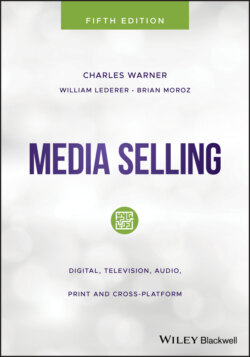Читать книгу Media Selling - Warner Charles Dudley - Страница 100
4. Responsibility to the community
ОглавлениеThe word community has many meanings, but in this context, it is limited to four: (1) the global community, (2) the general business community, (3) an industry community, and (4) a local community.
The global community. Each corporation and individual ultimately has a responsibility to the world community. We owe it to society to act in a way that provides the greatest good for the greatest number of people, that enhances the environment, that improves the human experience and condition, and that, in the words of the Hippocratic oath, does no harm. To answer questions about our social responsibility, we should always ask ourselves the question, “Suppose everybody did this?”13
The business community. As members of the free‐market business community salespeople must behave responsibly so that investors, regulators, and the general public have faith in our capitalistic system. All companies have, or should have, published rules, codes, or standards that prohibit unethical behavior such as selling stock based on inside knowledge, shredding documents or deleting computer files to avoid prosecution, cooking the books to inflate revenue, and avoiding sexual harassment. In business, as well as in society, salespeople must ask: “Suppose everybody did this? Would the regulators, investors, and the public maintain their faith in the free‐market system and in business?”
An industry community. The media have a special responsibility to the public because in many cases the media deliver the news to Americans. The public also forms many of their social values, beliefs, attitudes, and opinions from the digital, social, electronic, and print media. This enormous power makes it more imperative that the media wield that power responsibly. As a country, we altered our aggregate opinions about racial prejudice, about the war in Iraq, and about women’s rights while we watched images of these issues mesmerize, indoctrinate, and change us. The advertising messages between these images guaranteed the freedom of the press that bigots, the government, and non‐egalitarian people might not want us to have. If any one of these groups had controlled the media, we might not have been exposed to these issues and the truth would not have worked its torturous way into our collective consciousness. Therefore, media companies and their salespeople have the responsibility of keeping the media and the press free by fueling it with the advertising revenue it needs to remain so. Without a free, advertising‐ or subscriber‐supported media, there cannot be a free exchange of ideas. This exchange of ideas leads to an informed electorate, the foundation of our democracy. As a salesperson, you might say, “The high‐minded notion of protecting democracy is fine if you’re selling “60 Minutes” or CNN or the Washington Post, but I’m selling commercials on a Rock ‘N Roll radio station.” But no one program, no one news story, or no one medium is necessarily more important than another, rather it is the free‐market, advertising‐supported system that is important. By selling within that free‐market system, media salespeople are sustaining a market for advertising that supports all information and entertainment content. Salespeople must be ethical and play by the rules not only because public attention is focused on corporate ethics, but also because attention is intensely focused on the media. The believability of the media in general and journalism specifically has been eroding in recent years, and advertising has never been at the top of the list in the public’s esteem. Thus, the media must attempt to turn around the image, esteem, and credibility of its product (information, entertainment, and opinion) and its supporting buttress, advertising, if the media hope to thrive.14
A local community. All companies, organizations, and people have a responsibility as citizens to act responsibly and ethically towards their neighbors in the community where they live and work. The simple rule is, “Don’t foul your own nest. Don’t cheat your neighbor.” The local media must first serve their communities, for without local support, local media cannot thrive or even exist. Remember that broadcast media are given licenses based on their promise to serve their communities, so their obligation is not only a moral, social one, but also a regulatory one.
